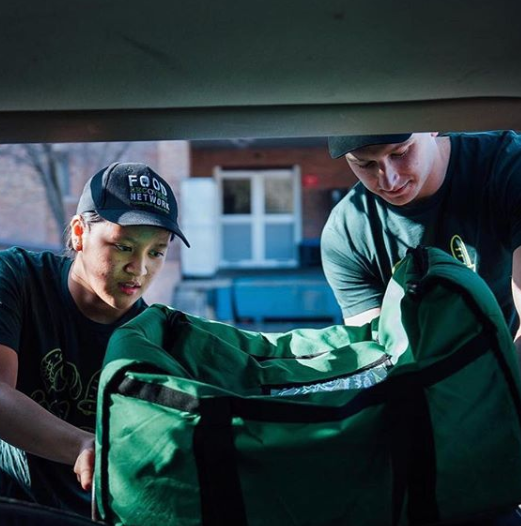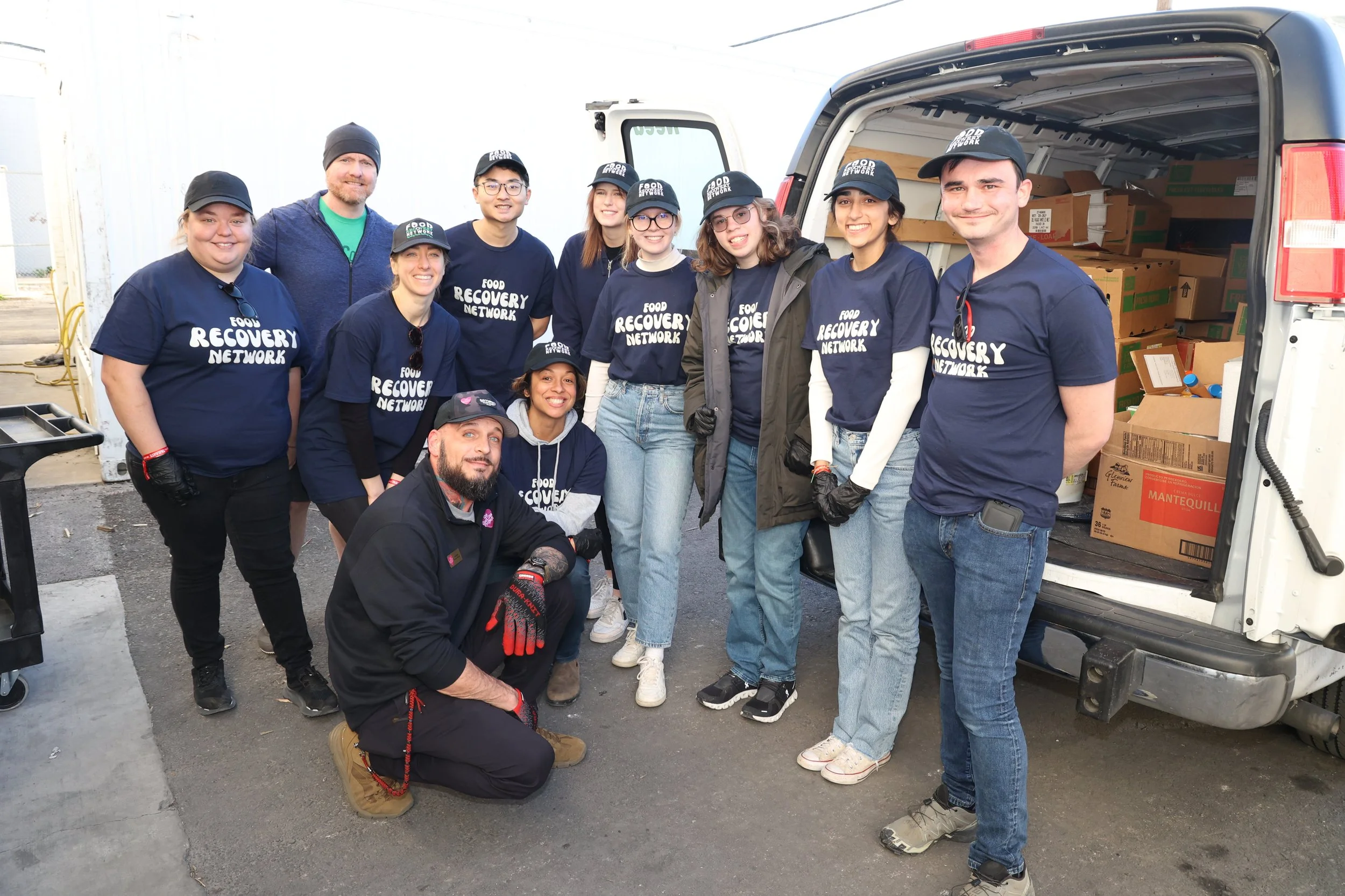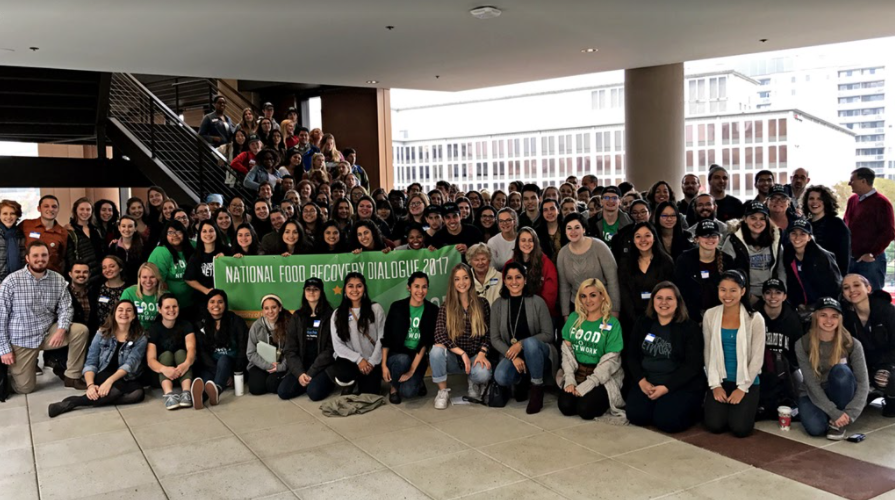Until recently, Food Recovery Network celebrated Dr. King’s National Day of Service as a day on, not a day off, for our team. Now, instead of celebrating MLK Day engaged in a worthwhile volunteer effort, Food Recovery Network offers 8 hours of paid time for each employee to use throughout the year for a volunteer activity of their choosing. The decision to stop organizing a group volunteer effort for our team on MLK Day came after I had years of experience at FRN and other nonprofits. I want to share with all of you why we came to celebrate MLK Day in this way and how this approach better fits FRN’s culture.
I recently wrote a blog post about my re-immersion into the history of MLK Day. That post came flooding out as part of my research to prepare for another post about the ripple effect that volunteering has on our communities, and specifically, the student-effect of the amazing FRN chapters across the US. I have so much to say about volunteering, its importance to me personally, and how it has shaped my life over the years. I’m a proud AmeriCorps volunteer, and previously, FRN hosted AmeriCorps VISTA service members. As part of our equity walk, work and practice, FRN no longer has a grant with the Corporation for National and Community Service (CNCS), the government program that supports AmeriCorps. Our history is forever tied with AmeriCorps, and I am so thankful to know the many VISTAs who have come through the doors of FRN to support our neighbors in receiving the food they deserve by training, mentoring and coaching our student leaders. I am also grateful that we have been able to realize our efforts to offer full-time and living wages to those we hire, and I know that AmeriCorps was a vital part of the effort to get to this place.
Feedback from our AmeriCorps VISTAs about volunteering on MLK Day helped shape my own thinking about how FRN could honor MLK Day. Volunteering for MLK Day was not always met with alacrity at FRN by our VISTAs or our staff. For a long time, to me that felt very counter to what we are trying to accomplish at FRN. Why wouldn’t our team who works so tirelessly with our students across the country want to celebrate MLK Day together engaging in a different kind of socially-focused project? I reflected on other MLK Day volunteer efforts I was a part of at other nonprofits and realized many times, those projects were also met with lukewarm enthusiasm. Why? Well, honestly, the reasons are many. It took a couple of years for me to figure it all out, and for me to hear and absorb what members of my team were telling me.
The culmination of all of this led FRN to reimagine how we volunteer and how we honor MLK Day. FRN now provides a bank of 8 paid hours to each employee to use to volunteer in lieu of a MLK Day volunteer service project. I’ve outlined the reasons why we made this change below, which do not reflect the stance of any one person on my team, but are a culmination of my experiences and feedback from staff:
MLK Day is a national holiday, and it’s the only day that is recognized as a day of service designed “to encourage all Americans to volunteer to improve their communities.” The tagline for MLK Day of Service, led by AmeriCorps, is that it’s “a day on, not a day off.” However, reflecting on my own experience and feedback from my staff, I find that if you work at a nonprofit, every day you show up to work is a day on, not a day off. Working in the nonprofit sector means you dedicate much of your day to a mission that once achieved, will make our communities better, safer, stronger, and more enjoyable. For many of us, this is our life’s work, and when that is the case, a day off might look very different than in other situations.
Two of my Intersectionalities in Practice conversations discuss the need to be gentle with ourselves and those around us so that we can show up strong in our work. When we need to rest, we can count on so many others who are doing the work, and then when they need to rest we can keep the work moving forward. In our conversation about combatting community disinvestment, we also spoke about the burnout that many of us in the nonprofit sector often experience due to constant resource scarcity. While we chose this sector and our particular professions within it, that does not mean we must work ourselves to a nub, and that healthy boundaries around work aren’t necessary. With this context, MLK Day offered a day of rest for my team who works so hard to support our student leaders across the country. I think ensuring my team can take the time they need to rest and replenish on MLK Day is a valuable way to honor Dr. King’s legacy.
FRN’s team members each have personal volunteer pursuits that are important to them, and our bank of 8 hours of paid volunteer time provides the flexibility for them to honor Dr. King’s commitment to service by engaging in efforts particularly meaningful to them. Recently our team had a conversation together about how we volunteer and it was so enjoyable to get to know what ignites passion for each of us outside of our work at FRN. I highly recommend engaging in a similar conversation with your team.
Many MLK Day service projects act as a team-building exercise for companies and organizations. I think this is a great idea. I became dear friends with a coworker whom I now consider a little brother during a MLK Day service project at the DC Center together many years ago. It was just the two of us from our organization and that provided the opportunity for us to talk for a few uninterrupted hours. This was the beginning of our journey to becoming a chosen family.
I mentioned FRN’s particular culture earlier. Our team has opportunities to bond every day through the structures and space we’ve set up within our organization. We learn about one another during our weekly one-on-one check-ins, our debriefs, and our free flowing chats before we “dig in” to the meetings or work at hand. For example, at our biweekly all-staff meetings we always start with a check in question. The questions range from very philosophical to funny and light, and this was actually how we all learned about each other’s volunteer pursuits. I highly suggest incorporating a check in question to your team meetings as a way to bond and build a compassionate workplace. I can only describe it as wonderful, and often exceedingly fun. Here are some of our recent check in questions:
What is your favorite road trip snack?
Tell us about any “pile” of things you have in your home that you need to deal with.
Talk to us about how you view branding and authenticity.
What is your unconventional idea (that is against the grain and isn’t popularly held) that if adopted would create a huge positive humanitarian impact in 10 or 15 years?
Tell us about an object that is within reach of you right now.
Our staff also chooses to volunteer on MLK Day! Many of us took an hour to be together with others from across the FRN network for a “power hour” of researching farms in Texas and Florida. This was not mandatory, but a volunteer opportunity we offered to both our staff and wider network. Our Program Manager, Erin sent this note to everyone who participated: “Your participation not only helps to keep Dr. King's legacy of service and his commitment to equality and justice fresh in our minds, but you've also helped to ensure that 156,000+ pounds of surplus food will be recovered That is AMAZING!”
Amazing indeed. I have organized MLK Day service events, and for anyone who also supports those activities, thank you. It takes a lot of time to coordinate service projects and that act is often overlooked by the actual event. Whatever project your organization volunteers to participate in, it matters and it makes a difference. At FRN, we see you, and we appreciate you. Thank you to the FRN team members who volunteer with youth, at farmers markets, and in social justice initiatives throughout the year. And for those of you who choose to take MLK Day as a day of rest, thank you, too, for there is power in rest.







